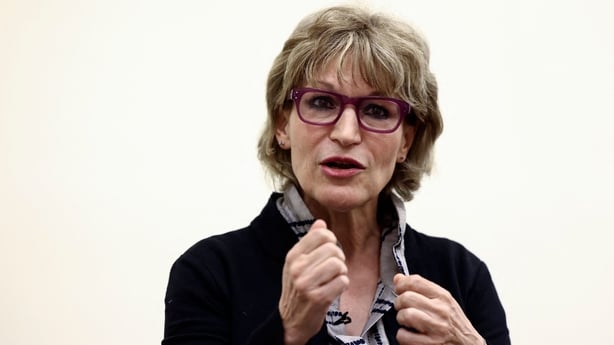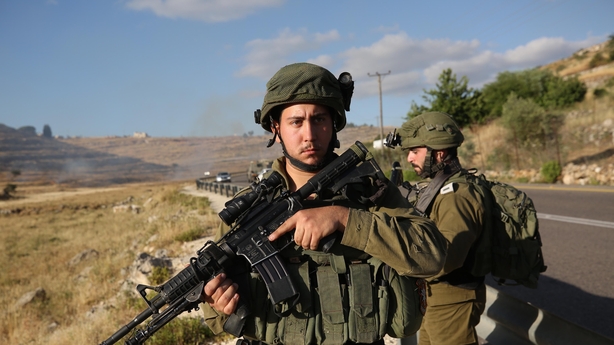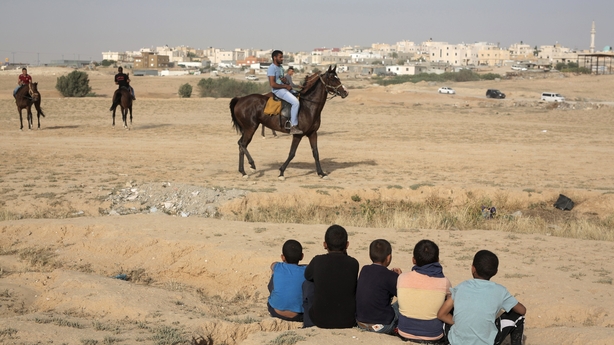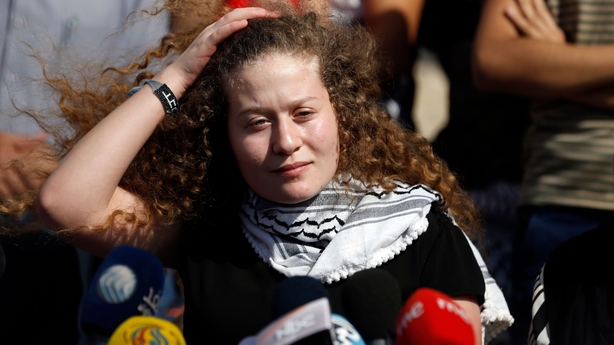Fourteen human rights organisations based in Israel have come to Amnesty International's defence, after the NGO was sharply criticised in some quarters for its claim that Israel is imposing a system of apartheid on Palestinians.
The 14 NGOs, including Human Rights Defenders Fund Israel and B'tselem, issued a statement after Amnesty's lenghty report was published last week.
They said: "We wholeheartedly reject the idea that Amnesty International’s report is baseless, singles out Israel or displays antisemitic animus.
"However, we are particularly concerned by the Israeli government’s extremely irresponsible allegation of antisemitism.
"Many of the most pre-eminent scholars of Jewish life, history and persecution have warned that the struggle against antisemitism in the world is being weakened by the unbearable, inaccurate and instrumentalised use to which the antisemitism accusation is lodged for political ends, in order to avoid debate about Israel’s oppressive policies towards the Palestinians.
"Attempts to distract from Israeli violations and to avoid substantive debate by hurling spurious accusations is the standard and ongoing practice of successive Israeli governments and their echo chambers overseas.
"We are especially concerned about this approach in an international climate, in which antisemitism and racism are on the rise and human rights defenders are under assault."
Apartheid has no place in our world, and states which choose to make allowances for Israel will find themselves on the wrong side of history - Agnès Callamard
Propaganda
After the publication of Amnesty's report, Israel’s Foreign Minister Yair Lapid accused the charity of spreading propaganda, adding: "I hate to use the argument that if Israel wasn't the Jewish state, no one at Amnesty would dare make such a claim against it.
"But in this case, there's simply no other explanation."
Germany and the US State Department have both rejected the central tenet of Amnesty's report that Israel's actions towards the Palestinians constitute apartheid.
"We reject expressions like apartheid or a one-sided focusing of criticism on Israel," German Foreign Ministry spokesperson Christopher Burger told a regular government news conference.
"That is not helpful to solving the conflict in the Middle East."
On 1 February, Israel was accused by Amnesty International of imposing a system of apartheid on Palestinians.
According to the extensive report: "Israel enforces a system of oppression and domination against the Palestinian people wherever it has control of their rights.
"This includes Palestinians living in Israel and the Occupied Palestinian Territories (OPT), as well as displaced refugees in other countries."

Apartheid regime
While Israel has been accused of perpetrating apartheid before, this is the first time an international organisation at the level of Amnesty International has gone as far as accusing the state of Israel of perpetrating apartheid against Palestinians as a whole.
"Our report reveals the true extent of Israel's apartheid regime," said Agnès Callamard, Amnesty International's Secretary General.
"Whether they live in Gaza, East Jerusalem, Hebron, or Israel itself, Palestinians are treated as an inferior racial group and systematically deprived of their rights.
"We found that Israel’s cruel policies of segregation, dispossession and exclusion across all territories under its control clearly amount to apartheid.
"The international community has an obligation to act," Ms Callamard said.
"There is no possible justification for a system built around the institutionalised and prolonged racist oppression of millions of people.
"Apartheid has no place in our world, and states which choose to make allowances for Israel will find themselves on the wrong side of history.
"Governments who continue to supply Israel with arms and shield it from accountability at the UN are supporting a system of apartheid, undermining the international legal order, and exacerbating the suffering of the Palestinian people.
"The international community must face up to the reality of Israel's apartheid, and pursue the many avenues to justice which remain shamefully unexplored."
The term 'apartheid' is not used without consideration, and provokes a strong retaliation, but Amnesty said its research has proven the existence of apartheid as a crime against humanity, under its international legal definition.
Amnesty also made the point that systems of oppression and domination are never the same, so it is not trying to assess whether modern day Israel is comparable to the system that existed in South Africa for almost 50 years until 1994.

Rome Statute
Under the Rome Statute of the International Criminal Court: "The crime of apartheid means inhumane acts (including but not limited to murder, torture, deportation or forcible transfer of population; imprisonment or other severe deprivation of physical liberty in violation of fundamental rules of international law) committed in the context of an institutionalised regime of systematic oppression and domination by one racial group over any other racial group or groups and committed with the intention of maintaining that regime."
In its report, Amnesty International documents acts proscribed in the Apartheid Convention and Rome Statute in all the areas Israel controls, although they occur "more frequently and violently in the OPT than in Israel".
The report said Israeli authorities enact multiple measures to deliberately deny Palestinians their basic rights and freedoms, including draconian movement restrictions in the OPT, chronic discriminatory under-investment in Palestinian communities in Israel, and the denial of refugees' right to return.
The report also documents forcible transfer, administrative detention, torture, and unlawful killings, in both Israel and the OPT.

Saleh Higazi, Deputy Regional Director of Amnesty International Middle East and North Africa, gave as an example the treatment of Palestinians in the Negev-Naqab Desert.
"You'll find that Palestinians there, Bedouin Palestinians, were in 1948, forcibly displaced, a number of times their lands dispossessed.
"And today they live in a reality where their homes are frequently demolished, while on the other hand, the Jewish communities are supported by the state to establish towns and villages and are provided with the basic services; electricity, water, education, the ability to participate also politically.
"While Palestinians live in what are called unrecognised villages, villages that do not receive these basic services from the state.
"No infrastructure, no water, no electricity and yes, they have the right to vote in, for example, municipal and parliamentary elections, but there's no infrastructure that supports them in being able to enjoy the right to political participation because they are stripped of the basic services and needs.
"So, this is apartheid where two people living in the same place are treated just so radically and significantly differently."
B'tselem, one of the 14 NGO’s that signed the letters, documents the demolition of Palestinian properties for the use of Jewish settlers.
In this video, B’tselem said that 30 buildings were demolished last month.
"Throughout January 2022, on orders of the Jerusalem Municipality, the Civil Administration and the Ministry of Interior, 30 structures were demolished in the parts of the West Bank annexed to Jerusalem's municipal boundaries.
"Twelve of the demolished structures were homes: one was still under construction and due to house a family of seven, including five minors, and the 11 others (five of which were demolished by their owners) housed a total of 71 people, including 32 minors, who were left homeless.
"The 18 remaining structures were not residential, but 13 of them were used for businesses that supported at least 45 people."
Reality of life
Mr Higazi himself is Palestinian and, when pressed, explained the reality of life for Palestinians living in Israel.
He was at pains to say the challenges he and others like him face pale in comparison to the lives of Palestinians living in Occupied Palestinian Territories.
"I'm Palestinian, my partner is also Palestinian, but we hold two different identities," Mr Higazi said.
"Palestinians have four types of identity cards, if any at all, [and] you have thousands of them living without legal status and at risk of being possibly deported out of their communities and their villages.
"For example, I'm able to go to the beach, which is about 45 minutes away from where we live. But my wife is not.
"So if I want to go, I have to apply to the military to get her a permit, so that me and her, along with our children, can go all together, to enjoy a day at the beach."
He interrupts his flow to say he knows this is not in any way comparable to the oppression suffered by communities in Sheikh Jarrah, "who are at imminent risk of losing their homes ... or Palestinians in Gaza who for generations have not seen anything outside of what has been called the largest open-air prison in the world".
But he gives the example of how, in his words "apartheid seeps really deep into the most intimate of spaces, into the home, and you can you feel it in everyday life that there is a difference between me and my wife that I'm unable - because of Israeli policies - to pass on the same legal status that I have to her.
"She cannot become an Israeli citizen like I am. She is only a Palestinian, a stateless Palestinian with an identity card that is issued by Israel."
He said for many Palestinians, there is a "feeling of oppression and domination inside your home, outside when you're driving on the street, when you're coming to a checkpoint, we're even scared about the violence that might erupt".
Nabi Saleh
He gives the example of the village of Nabi Saleh, where Israeli forces have regularly raided homes at night.
"Children are woken up by heavily armed forces, bringing them out of their beds and taking pictures of them because of [the] suspicion of throwing rocks," he said.
Nabi Saleh, which is in the West Bank near Ramallah, was for years the location of weekly protests by residents against land seizures, and what they call the Israeli occupation.
The Israeli newspaper Haaretz referred to it as "the Palestinian village that never sleeps", due to the constant nightly raids on homes by the Israeli army.

A young resident of Nabi Saleh, Ahed Tamimi, came to international prominence in 2017/18, when she was jailed aged 16 for assaulting an Israeli soldier during one of the weekly protests.
In the report, Amnesty International said that the neighbouring Israeli settlement of Halamish expropriated land from Nabi Saleh, including a water source.
It said: "Israeli forces have repeatedly used excessive force in response to the protests and during search and arrest raids.
"Such actions have, since 2009, caused the deaths of four people in the village."
It goes on to conclude that "the combined impact of the army's repressive and restrictive policies and practices in Nabi Saleh appears to amount to collective punishment, whereby the population as a whole is penalised, including those who play no active part in the activism against Israeli rule.
"Collective punishment of protected persons in an occupied territory is prohibited under international humanitarian law and when imposed constitutes a war crime.
"It is also a serious violation of international human rights law."
'False allegations'
Responding to the report, Israel said: "The State of Israel absolutely rejects all the false allegations that appear in the report."
Mr Lapid said: "Amnesty was once an esteemed and respected organisation.
"Today, it stands for anything but human rights. It's become simply one more radical grouping of uninformed activists that echoes propaganda with no serious examination of the facts.
"Instead, Amnesty quotes the lies of terrorist organisations. Five minutes of serious fact checking would have been enough to learn that what appeared in this week's report were delusional - divorced from reality.
"Israel is not perfect, but it is a democracy committed to international law and open to scrutiny, with a free press and a strong Supreme Court."
The 14 Israeli NGOs are calling on the Israeli government to "stop its oppressive and discriminatory practices and its dangerous game of defamation and disinformation".
The organisations are: Adalah | Bimkom – Planners for Planning Rights | Breaking the Silence | B’Tselem | Combatants for Peace | Gisha | HaMoked: Center for the Defense of the Individual | Haqel: In Defence of Human Rights | Human Rights Defenders Fund | Ofek: The Israeli Center for Public Affairs | Parents Against Child Detention | Physicians for Human Rights Israel | The Public Committee Against Torture In Israel | Yesh Din







